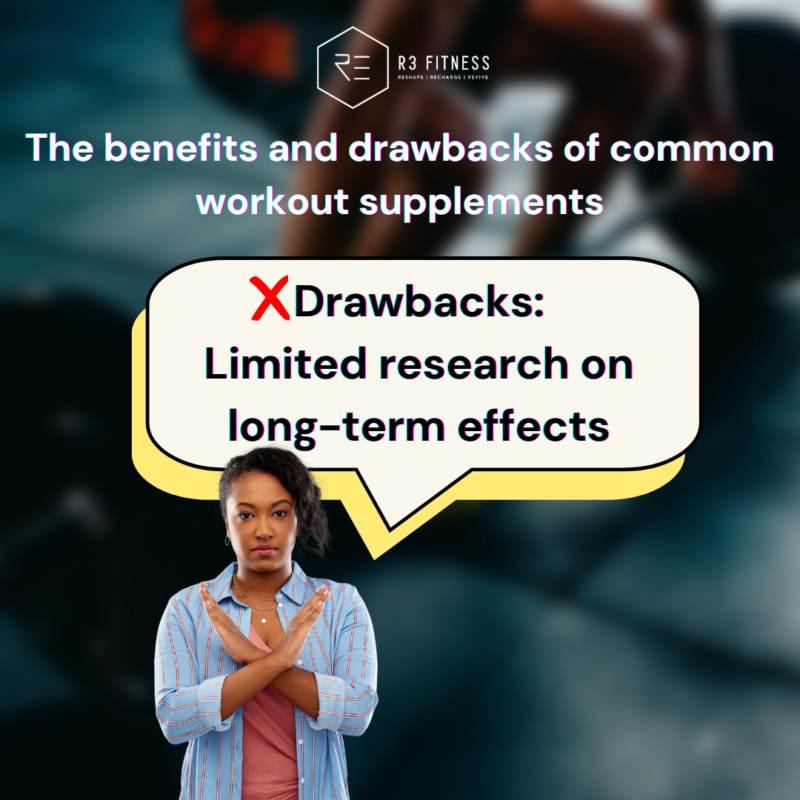Knowledge about workouts and nutritions, Tips for workout
The benefits and drawbacks of workout supplements
The benefits and drawbacks of workout supplements
Workout supplements are products designed to enhance athletic performance and support the recovery process after exercise. Some common workout supplements include protein powder, creatine, beta-alanine, and caffeine. Here are the benefits and drawbacks of workout supplements:
The benefits and drawbacks of common workout supplement
Benefits:
- Increased energy and endurance
- Enhance muscle growth and recovery
- Improved athletic performance
- Reduced muscle soreness
Drawbacks
- May contain banned or dangerous substances
- Limited research on long-term effects
- May interact with medications
- Overuse can lead to dependence or addiction

Increased energy and endurance
Increased energy and endurance are potential benefits of taking certain workout supplements, such as caffeine or beta-alanine. Caffeine boosts energy and alertness, allowing for improved focus and performance during workouts. Beta-alanine improves endurance by reducing fatigue during high-intensity exercise. However, it’s important to note that taking supplements alone will not guarantee increased energy and endurance, and a balanced diet and regular exercise regimen should also be maintained.

Enhanced muscle growth and recovery
Enhanced muscle growth and recovery are potential benefits of taking certain workout supplements, such as protein powder and creatine. Protein powder helps build and repair muscle tissue, making it essential for strength training and bodybuilding. Creatine increases energy production and strength, allowing for more intense workouts and improved athletic performance.

Improved athletic performance
Improved athletic performance is a potential benefit of taking certain workout supplements, such as creatine, beta-alanine, and caffeine. Creatine increases energy production and strength, allowing for more intense workouts and improved athletic performance. Beta-alanine improves endurance by reducing fatigue during high-intensity exercise. Caffeine boosts energy and alertness, allowing for improved focus and performance during workouts.

Reduced muscle soreness
Reduced muscle soreness is a potential benefit of taking certain workout supplements, such as protein powder and creatine. Protein powder helps build and repair muscle tissue, making it essential for strength training and bodybuilding, while also supporting the recovery process after exercise. Creatine also supports the recovery process by increasing energy production and reducing muscle damage.

May contain banned or dangerous substances
This is a major drawback of some workout supplements. Some supplements may contain banned or dangerous substances that can cause adverse health effects or result in failed drug tests. The FDA does not regulate the manufacture of dietary supplements, so the quality and purity of these products can vary widely.

Limited research on long-term effects
Another drawback of workout supplements is the limited research on their long-term effects. Many supplements have not been thoroughly studied, particularly with regards to their effects over an extended period of time. This means that the potential risks and side effects of long-term use are not well understood, and there may be unknown health consequences associated with taking certain supplements. Additionally, some studies have shown that certain supplements can have adverse effects when taken in combination with other medications, so it’s important to consult a healthcare professional before starting a supplement regimen.

May interact with medications
This is a potential drawback of taking workout supplements. Some supplements can interact with prescription medications and alter their effectiveness or cause adverse side effects. Additionally, some supplements may affect medical conditions, such as high blood pressure or kidney function, so it’s important to consult a healthcare professional before starting a supplement regimen to ensure that it is safe and appropriate. A healthcare professional can also advise on any potential interactions between the supplement and any other medications that the individual is taking.

Overuse can lead to dependence or addiction
Overuse of some workout supplements, particularly stimulant-containing supplements such as caffeine, can lead to dependence or addiction. Consuming high doses of caffeine or other stimulants regularly can lead to tolerance, where more and more of the substance is needed to achieve the same effect, and withdrawal symptoms when the supplement is discontinued. This can result in a cycle of overuse and dependence, and in severe cases, may lead to addiction. Additionally, overuse of certain supplements, such as caffeine, can result in negative side effects such as anxiety, jitters, or disrupted sleep. It’s important to follow recommended dosages and to consult a healthcare professional before starting a supplement regimen.

